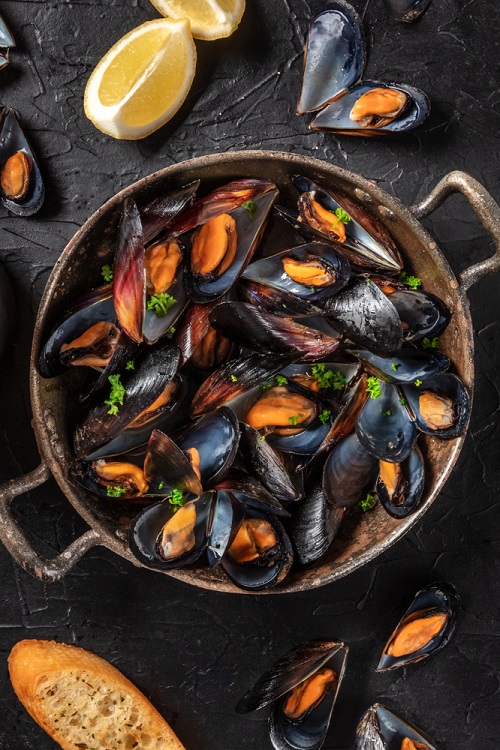Can Dogs Eat Mussels? Can dogs safely snack on these shellfish? Let’s find out whether you should give them these or not?
Can Dogs Eat Mussels? If you are not sure about this, then we are here to help you out! Keep on reading to get the answer!
What are Mussels?

Mussels are a type of shellfish that live in freshwater and saltwater habitats all around the world. They are bivalve mollusks, meaning they have a two-part hinged shell that they can open and close to filter water and capture food.
They are typically cooked and served in a variety of dishes, including soups, stews, pasta, and as a standalone dish.
Read Can Dogs Eat Spam here
Can Dogs Eat Mussels?
Are Dogs Allowed to Eat Mussels?
Yes, dogs can eat mussels in moderation and when they are properly prepared. Mussels should be given as an occasional treat and not as a staple in a dog’s diet, as they are high in sodium and can lead to health issues if consumed in excess.
Are Mussels Safe for Dogs-Health Benefits
Yes, mussels can be safe for dogs and offer several health benefits when incorporated into their diet. Here are some key points to consider:
- Nutritional value: Mussels are rich in essential nutrients, including protein, vitamins (such as B12 and C), minerals (like iron, zinc, and selenium), and omega-3 fatty acids. These nutrients can support your dog’s overall health and well-being.
- Omega-3 fatty acids: Mussels are a particularly good source of omega-3 fatty acids, such as EPA (eicosapentaenoic acid) and DHA (docosahexaenoic acid). These fatty acids have anti-inflammatory properties and can promote healthy skin and coat, support brain function, and aid in the management of conditions like arthritis in dogs.
- Joint health: The omega-3 fatty acids found in mussels can be beneficial for maintaining joint health in dogs. They have been associated with reducing inflammation and supporting joint mobility, making them potentially helpful for dogs with arthritis or joint-related issues.
- Antioxidants: Mussels also contain antioxidants, which can help neutralize harmful free radicals in your dog’s body and support their immune system.
Check out Can Dogs Eat Tilapia here
Are they Bad for Dogs-Health Concerns
While mussels can offer several health benefits for dogs, there are also some health concerns to consider when feeding mussels to your furry friend:
- Allergies: Some dogs may be allergic to shellfish, including mussels. If your dog has a known shellfish allergy or a history of allergic reactions to seafood, it’s best to avoid feeding them mussels. Monitor your dog closely for any signs of an allergic reaction, such as itching, hives, swelling, vomiting, or diarrhea, and consult your veterinarian if you have any concerns.
- Bacterial contamination: Mussels can harbor bacteria or parasites, which can cause illness in dogs if the mussels are raw or improperly cooked. Ensure that the mussels are thoroughly cooked to kill any potential pathogens and reduce the risk of foodborne illnesses.
- High purine content: Mussels contain purines, which can be converted into uric acid in the body. Dogs with certain health conditions, such as kidney problems or a history of urinary tract issues, may need to limit their purine intake.
- Choking or digestive issues: Mussels have shells that can pose a choking hazard or cause obstructions in a dog’s digestive system. It’s important to remove the shells entirely before feeding mussels to your dog. Additionally, some dogs may have difficulty digesting shellfish or may experience digestive upset if mussels are introduced too quickly or in large quantities. Start with small portions and observe how your dog responds.
How to Feed Mussels to Dogs?
If you want to feed your dog mussels, here are some tips on how to do it safely:
- Start with a small amount: Introduce mussels to your dog’s diet slowly and in small quantities. This will help you monitor your dog’s reaction and prevent digestive upset.
- Cook the mussels thoroughly: Mussels should always be cooked before feeding them to dogs. Boil or steam them for about 5-10 minutes until the shells open. Remove the shells before serving, and make sure the mussels are cool before giving them to your dog.
- Serve plain mussels: Do not add any seasoning or sauces to the mussels, as they can contain ingredients that are harmful to dogs. Plain mussels are a great source of protein, omega-3 fatty acids, and other essential nutrients for dogs.
- Feed in moderation: Mussels should be given as an occasional treat and not as a regular part of your dog’s diet. They are high in sodium, which can cause health issues if consumed in excess.
- Watch for any signs of adverse reactions: Monitor your dog for any signs of an adverse reaction to mussels, such as vomiting, diarrhea, or an allergic reaction.
Check out Can Dogs Eat Couscous here
How to Cook Mussels for Dogs?

To cook mussels for dogs, follow these simple steps:
- Clean: Rinse the mussels under cold running water and scrub them with a brush to remove any dirt or debris on the shells.
- Check for freshness: Discard any mussels that are cracked, broken, or do not close when tapped, as they may not be fresh.
- Boil or steam: Place the mussels in a pot of boiling water or steam them for about 5-10 minutes until the shells open.
- Remove the shells: The shells can pose a choking hazard or cause digestive issues if consumed by dogs.
- Serve plain: Do not add any seasoning or sauces to the mussels, as they can contain ingredients that are harmful to dogs. Plain mussels are a great source of protein, omega-3 fatty acids, and other essential nutrients for dogs.
Some Good Ideas for Mussels Treats
Here are a few ideas for mussels treats for dogs:
- Mussels and Sweet Potato Mash: Cooked and mashed sweet potatoes mixed with steamed mussels can make a tasty and healthy treat for dogs. Sweet potatoes are a great source of fiber and vitamins, while mussels provide protein and omega-3 fatty acids.
- Mussels and Brown Rice: Cooked brown rice mixed with chopped steamed mussels can make a nutritious treat for dogs. Brown rice is a good source of fiber and complex carbohydrates, while mussels provide protein and omega-3 fatty acids.
- Mussels and Vegetables: Steamed mussels mixed with chopped vegetables such as carrots, green beans, and broccoli can make a healthy and satisfying treat for dogs. Vegetables are a great source of vitamins and fiber, while mussels provide protein and omega-3 fatty acids.
- Mussels and Apples: Cooked and chopped apples mixed with steamed mussels can make a tasty and nutritious treat for dogs. Apples are a good source of fiber and vitamins, while mussels provide protein and omega-3 fatty acids.
Remember to keep the serving size small and to introduce any new food gradually to avoid any digestive upset. As always, it’s best to consult with your veterinarian before introducing any new foods to your dog’s diet.
Read Can Dogs Eat Jasmine Rice here
Can Dogs Eat Mussels? Quick Takeaways
So, Can Dogs Eat Mussels? Mussels can be a healthy and nutritious addition to your dog’s diet when served in moderation and cooked properly.
As with any new food, it’s best to introduce mussels gradually and monitor your dog for any signs of digestive upset or allergic reactions. If your dog experiences any adverse reactions, contact your veterinarian for advice.
FAQs
1. Can Dogs Eat Mussels Cooked?
Yes, dogs can eat cooked mussels as long as they are thoroughly cooked and the shells are removed. Cooked mussels can be a healthy addition to their diet when prepared properly.
2. Can Dogs Eat Mussel Shells?
No, dogs should not eat mussel shells. Mussel shells can pose a choking hazard and may cause digestive issues if ingested. It’s important to remove the shells entirely before feeding mussels to your dog.
3. Can Dogs Eat Black Mussels?
Black mussels, also known as blue mussels, are safe for dogs to eat when properly cooked. Remember to remove the shells and feed them in moderation as part of a balanced diet.
4. Can Dogs Eat Canned Mussels?
Canned mussels are not recommended for dogs. They may contain added salt or preservatives that can be harmful to dogs. Freshly cooked mussels without any added seasonings or additives are a better option.
5. Can Dogs Eat Cooked Mussels?
Yes, dogs can eat cooked mussels. Cooking the mussels thoroughly helps eliminate the risk of bacteria or parasites. However, make sure to remove the shells before feeding them to your dog.
6. Can Dogs Eat Green-Lipped Mussels?
Green-lipped mussels are a specific type of mussel known for their high concentration of omega-3 fatty acids. Dogs can eat green-lipped mussels as long as they are cooked, the shells are removed, and they are fed in moderation.
7. Can Dogs Eat Mussel Meat?
Yes, dogs can eat mussel meat. Mussel meat is the edible part of the mussel and can be a healthy addition to a dog’s diet when cooked and prepared properly.
8. Can Dogs Eat Raw Mussels?
It is not recommended to feed dogs raw mussels. Raw mussels can contain bacteria or parasites that can be harmful to dogs. It’s best to thoroughly cook the mussels before feeding them to your dog.
9. Can Dogs Eat Seafood Mussels?
Seafood mussels, like other types of mussels, can be fed to dogs when properly cooked and prepared. Ensure that the mussels are cooked thoroughly and the shells are removed before feeding them to your dog.
10. Can Dogs Eat Smoked Mussels?
Smoked mussels are not recommended for dogs. The smoking process often involves adding salts, flavorings, or other additives that may be harmful to dogs. It’s best to stick to freshly cooked mussels without any added ingredients when feeding them to your dog.

